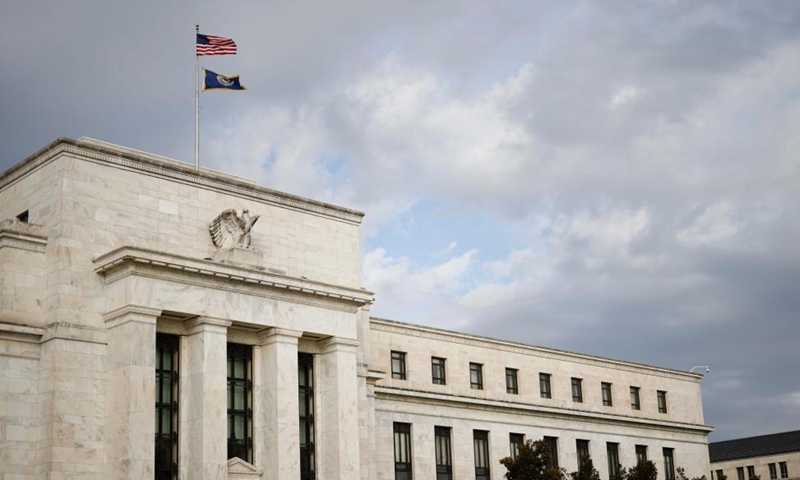
Photo taken on Jan. 25, 2022 shows the US Federal Reserve in Washington, D.C., the United States. Photo:Xinhua
The US Federal Reserve on Wednesday US time moved to raise interest rates by a larger-than-usual 75 basis points (bps), making clear its intention to rein in runaway inflation, while intensifying market fear of a looming US recession that could have serious global implications.
The Fed's move may not only accelerate the start of a US recession but may also fail to tame soaring consumer prices, Chinese economists said on Thursday, predicting a US recession may be inevitable. In the short term, the rate hike may further exacerbate capital outflows in emerging market economies, but the impact on China will be limited, experts said.
The Fed's rate hike on Wednesday matched the magnitude of its June hike - the largest single-meeting rate rise since the early 1990s. The Fed raised rates by 25 bps in March and 50 bps in May.
The Fed's move, which was largely in line with market expectations, came about two weeks after US government data showed price growth accelerating again last month. The Consumer Price Index, a closely watched inflation metric, soared 9.1 percent in June, marking the fastest pace since November 1981.
"Inflation remains elevated, reflecting supply and demand imbalances related to the pandemic, higher food and energy prices, and broader price pressures," the Fed said in a statement after a two-day policy meeting, adding that it is "highly attentive to inflation risks."
According to Hu Qimu, chief research fellow at the Sinosteel Economic Research Institute, the US is already on a cusp of a technical recession, which is often characterized as two consecutive quarters of GDP contraction, and it's on the way to a formal recession that could last six months to one year.
The US economy shrank at an annual rate of 0.9 percent in the second quarter after a 1.6-percent contraction in the previous quarter, the US Commerce Department reported Thursday.
"A US recession is almost inevitable due to its economic structural vulnerabilities, since a long-term hollowing out of US manufacturing and increasing protectionism cannot support its sustainable economic growth," Dong Shaopeng, an expert advisor at the China Securities Regulatory Commission, told the Global Times on Thursday.
Wan Zhe, an economist and professor at the Belt and Road School of Beijing Normal University, also predicted a formal US economic recession in 2023 after a technical recession in the near future.
Experts also warned that interest rate hikes might not be as effective in curbing inflation as officials had thought, as the primary factors that drove this round of price hikes have not been removed.
The Fed's interest rate increases should alleviate inflation, but only to some extent, as it is rooted in geopolitical conflicts, Dong Dengxin, director of the Finance and Securities Institute of the Wuhan University of Science and Technology, told the Global Times on Thursday.
"The Fed's interest rate hikes can't fundamentally solve inflation, because the main cause at present is energy shortages amid the conflict between Russia and Ukraine, worsened by the US' crackdown on China, the world's largest manufacturing country with additional tariffs on Chinese imports," Dong said.
According to Dong, how long US inflation lasts depends on how radical the Fed's rate hikes are, and whether the US will correct its decoupling from China.
Experts said the rate hikes will have a negative impact on global markets, such as affecting US imports as a result of economic cooling. They will also compress the policy space for global central banks, as rising interest rates for the US dollar will trigger capital outflows to the US.
But Hu stressed that the impact would be milder on China than on most markets, as the yuan's strengthening would attract more long-term investors, offsetting short-term capital outflows.
Chinese stock markets were relatively stable after news of the Fed hike. The benchmark Shanghai Composite Index rose by 0.21 percent, while the smaller Shenzhen index edged up by 0.23 percent. The Hang Seng Index was down 0.23 percent.
"Having conditioned market expectations to anticipate 'jumbo' hikes of 75bps, the Fed delivered on its promise. In doing so, it fulfilled market expectations and spurred a relief rally in risk assets," Aninda Mitra, head of Asia macro and investment strategy of BNY Mellon Investment Management, told the Global Times on Thursday via a written statement.
In a press conference Wednesday afternoon, Fed Chairman Jerome Powell left the door open for another "unusually large increase" at its next meeting in September, but noted that would depend on upcoming economic data.




